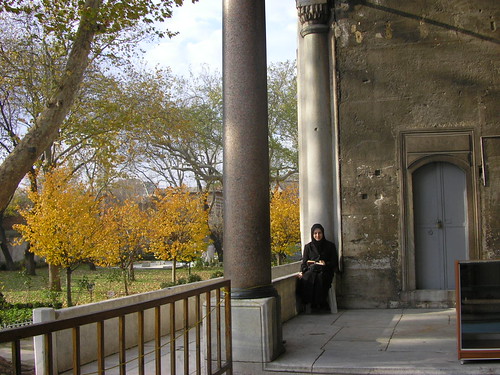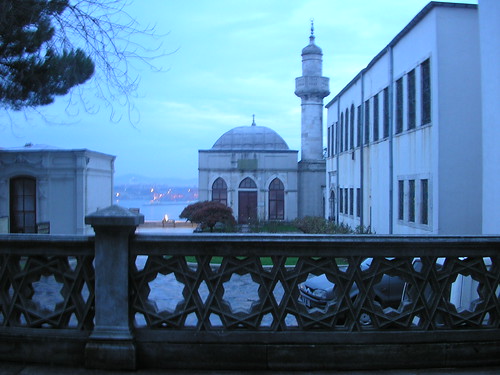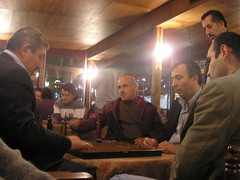Beyond free speech
 What are the issues in the IRS/All Saints Pasadena case? They come down to the most basic troubles Americans have with understanding what the Bible genuinely says, how the Bush regime has stooped to distorting justice, and legitimate vs. illegitimate use of the church in politics.
What are the issues in the IRS/All Saints Pasadena case? They come down to the most basic troubles Americans have with understanding what the Bible genuinely says, how the Bush regime has stooped to distorting justice, and legitimate vs. illegitimate use of the church in politics. First, there's the issue of how the IRS has been used as a partisan weapon. We hear nothing about the IRS condemning the most flagrant of political church endorsements, the infamous Bush Fish. Similarly, the IRS's campaign against church politics has unveiled remarkably little like the experience of the CrossLeft reader who left her church after a conservative preacher's sermon on how all Democrats were going to Hell.
On the other side, liberal groups seem to suffer a statistically remarkable degree of persecution. The NAACP has recently met with similar assaults from the IRS for its political stakes. To let the IRS's stance go without accusations of extremely inappropriate political motivation is corrupt governmental practice that calls for immediate investigation and oversight.
Another issue at stake here is the forced and arbitrary representation of the church in American society. The church, let us remember, was an unwilling pawn in the call to go to war. Muslims were "threatening Christian values." America was defending those prerogatives of Western, Christian countries; "liberty and Democracy". Bush, the war's president, had ridden into office on a wave of "voting church-goers." War and presidency alike were blamed on Mel Gibson, megachurches, and the evangelicals' campaign to register all in the pews for the vote.
How ironic that a president who benefitted to grandly from the conservative Christian vote should preside quietly over the persecution of the liberal Christian vote. The media now have a chance to set the record straight: Christians did not, in overwhelming numbers, vote for Bush, nor does the Bush agenda of punishing the poor and indulging in wanton torture convene anything resembling a plan of Christian values.
A single church has now, across the nation, been published as representing non-Bush values, and being penalized for it. At stake here is not just freedom of speech, but the true and accurate depiction of Christianity in America. We are overdue for an explanation of why Christianity has been represented as pro-Bush, and the All Saints case has given America its first opportunity to face the angry truth.
The antiwar sermon preached at All Saints Pasadena went beyond a gesture of Free Speech: it was a gesture of Biblical honesty in the face of a culture that has indulged in corrupt, public distortions of the Bible.
All Saints Pasadena, like numerous others in the wake of the invasion of Iraq, have preached against war, specifically against war based on obvious deceit and use of the media to inflame racially and religiously tinged paranoia. A sermon for "peace" is doubly threatening to the Bush regime. Conservatives advance the claim that to be anti-war is to be anti-American and therefore anti-Christian. But with all Biblical evidence behind them, the All Saints clergy rightly preached that Christians necessarily worship a Prince of Peace. They made the case that this war in particular advanced no peaceful causes.
All Saints, that is, merely preached the Bible to the present day. The sound application of Biblical injunction to contemporary evidence is a terribly necessary item in the public debate.
The sermon at All Saints Pasadena represented the Bible in its true light, as opposed to real, graphic distortions of the Bible on behalf of contemporary politics, which flagrantly demand to be prosecuted under the IRS law.
Thousands of conservative churches preach against abortion and gay rights -- similarly political, candidate-linked issues. In doing so they attempt to apply Biblical passages to contemporary issues. Bible-literate Christians realize that, of the hundreds of passages about poverty and peace-making in the Bible, a miniscule amount point to anything about sexuality or pre-birth mortality. The bulk of the Bible is on the side of peace. The interpretation of the Bible in the case of a present-day war is a necessary act for the Christian, not an excessive whinging of theological scruple.
This, then, is the test we must apply to the sermonizing preacher. The laws exist to keep obvious wrangling of religion for politics outside of the legal: Has the figure in the pulpit drawn obscure passages in the Bible into one long, twisted path of reasoning which endorses one candidate because he was born with a caul on his head? Or has the preacher rightly pointed to one of the great cruxes of his religion, and advanced a proposition about one of the most crucial moral concerns of the present day?
For according to the law, which acts rightly to defend a state free of theocracy, some lines must be drawn here. The incitement of violence against gay people or people of color or women, based on obscure passages in any holy book, is rightly regarded as hate speech in many countries: it ought to be in ours. But the application of a central theme of the Bible -- peace-making, poverty, compassion -- to the present day: this is *the* central mission of the Christian religion.
Reporters act as if this is far too advanced and theological an interpretation for them to deal with. Indeed, it's dangerous territory; to separate the great themes of religion from the small, seems -- from a certain perspective -- to apply the interpretive lens of the state on what constitutes correct morality. And the state cannot be held responsible for sorting correct theology from incorrect theology.
It's time to rebuke the cowardliness of reporters who won't take up theological issues. All Saints Pasadena is clearly on the side of theological tradition, Biblical interpretation, and the weight of the Christian religion. If the IRS persecutes All Saints Pasadena, it makes an assault on all those who reaad the Bible.
The law was written to give the IRS full excuse to abolish the likes of the BushFish and the arbitrary ilk of Tim le Haye who call Armageddon down on the United Nations. It was meant to reprimand arbitrary and unconscionable application of the Bible in obscure formulations to contemporary elections. The law meant to outlaw carped religion has been glibly skipped over in the case of the most offensive culprits, and it has been applied to the most innocent.
It is incredibly sad how loosely and ineptly we have articulated the central issues in this case. Left and Right speak not about church abuse of fringe issues, nor about presidential persecution of minorities, but about something as vague and omnipresent as "freedom of speech."
On another NPR roundtable, the commentators defend All Saints Pasadena, saying, "if the purpose of the church isn't to speak truth to power, what is it?" Well indeed. But the issues here go well beyond freedom of speech.
In the other corner, preaching something that sounds suspiciously American apple-pie-like as "separation of church and state," are conservative seminary students, who argue that the churches shouldn't endorse certain candidates at all. They argue for preaching family values, for preaching against abortion, and dozens of other issues which are linked to a very particular array of candidates. The IRS's position is about churches "endorsing specific candidates." These conservative legal scholars argue that All Saints should have educated its preachers better about the law. They make no bones over the vagueness of how "endorsing specific candidates" applies to biblically informed anti-war speech. They refuse to see the All Saints issue as an issue specific to a partisan cause or to the quandaries of political religion in which the Bush regime has placed us.
We must not be such fools. We must not merely let this slip away as a first-amendment issue. The status of Christianity in America, of morality in the public debate, of all the traditions of peace-making and social redemption of the poor: all this is at stake, and we must speak clearly now in order that the voice of progressive Christianity not be lost but be loudly defended against the madness of trifling scribblers.
-
All Things Considered has just reported a story on Ed Bacon's church: "IRS Steps Up Scrutiny of Political Activity from Pulpit Web Extra Read Sermon That Sparked an IRS Probe"
You can read the sermon from All Saints Pasadena that sparked the IRS probe, read the IRS letter, and read the church's response.


 The first risk, of course, is the increasing social divisions implied by architecture that keeps to these strict patterns in an already socially divided city like Dallas, where the color line starts at the Trinity River. The community not far from these fantastic flights of glass and limestone has as much texture as a detective novelist or urban historian could wish for.
The first risk, of course, is the increasing social divisions implied by architecture that keeps to these strict patterns in an already socially divided city like Dallas, where the color line starts at the Trinity River. The community not far from these fantastic flights of glass and limestone has as much texture as a detective novelist or urban historian could wish for.  Having spent a few weeks in England -- nursed to health on the largesse of the National Health Service, gorging his mind on BBC WorldService, Le Monde Diplomatique, and The Guardia -- my boyfriend has returned to California. James is suffering readjustment problems, to say the least:
Having spent a few weeks in England -- nursed to health on the largesse of the National Health Service, gorging his mind on BBC WorldService, Le Monde Diplomatique, and The Guardia -- my boyfriend has returned to California. James is suffering readjustment problems, to say the least: In Cambridge, we toss gently around the idea that there simply *is* no more military intelligence in the United States. By which we do not mean to impugn the IQs of the respected operators. Rather merely to point out that the CIA and its ilk have, despite their immense mapping strategies, networks, and mechanisms for collecting data, remarkably little oversight how that data is analyzed. As a result, there is remarkably little intelligence analysis in a concerted fashion. 500 analysts write a report on their country every day; scarcely any mechanism exists for sorting those reports into anything useful.
In Cambridge, we toss gently around the idea that there simply *is* no more military intelligence in the United States. By which we do not mean to impugn the IQs of the respected operators. Rather merely to point out that the CIA and its ilk have, despite their immense mapping strategies, networks, and mechanisms for collecting data, remarkably little oversight how that data is analyzed. As a result, there is remarkably little intelligence analysis in a concerted fashion. 500 analysts write a report on their country every day; scarcely any mechanism exists for sorting those reports into anything useful.

 Call for the therapy state:
Call for the therapy state: 
 Liberals want to know how to win elections. Recently, you've heard a lot more of a clever but dangerous proposition about how to form a coalition of moderate Christians free from the claws of the radical right fringe cult. The proposition runs thus: we want progressives to work with moderates to build a more powerful political coalition, so we must jettison gay marriage and abortion from the political agenda.
Liberals want to know how to win elections. Recently, you've heard a lot more of a clever but dangerous proposition about how to form a coalition of moderate Christians free from the claws of the radical right fringe cult. The proposition runs thus: we want progressives to work with moderates to build a more powerful political coalition, so we must jettison gay marriage and abortion from the political agenda.

 I've spent the past few days wandering around the straits of the Bosphorus with my friend James. Istanbul is a remarkable ode to the meeting of cultures: the ancient and the modern, East and West, Islam and Christianity, side by side. For centuries, Europeans built cathedrals and Jews synagogues on one side of the Golden Horn; Ottoman sultans built mosques on the other. Today the three cultures exist side by side, crescent by star by cross, as geographical a testament to the integration of the three "religions of the book" as one could wish.
I've spent the past few days wandering around the straits of the Bosphorus with my friend James. Istanbul is a remarkable ode to the meeting of cultures: the ancient and the modern, East and West, Islam and Christianity, side by side. For centuries, Europeans built cathedrals and Jews synagogues on one side of the Golden Horn; Ottoman sultans built mosques on the other. Today the three cultures exist side by side, crescent by star by cross, as geographical a testament to the integration of the three "religions of the book" as one could wish.  The Turkish government, intent on promoting itself as fully compatible with the European Economic Community, forcibly promotes as syncretic and pluralistic a religious community as can be seen anywhere in the world. The headscarf is banned on the grounds of promoting a culture free from the tyrannies of religion through social conformity (the ban is enforced only at schools, and insistence on the private choice of women to their own statement of belief is carried forward by the wife of Prime Minister Recep Tayyip Erdogan, who continues to
The Turkish government, intent on promoting itself as fully compatible with the European Economic Community, forcibly promotes as syncretic and pluralistic a religious community as can be seen anywhere in the world. The headscarf is banned on the grounds of promoting a culture free from the tyrannies of religion through social conformity (the ban is enforced only at schools, and insistence on the private choice of women to their own statement of belief is carried forward by the wife of Prime Minister Recep Tayyip Erdogan, who continues to 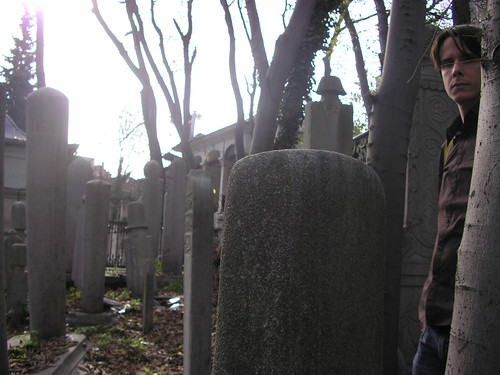 James and I wandered through the Sufi monastery where lay the bodies of dead dervishes and mystics who wrote love poetry to God. In the peace of that graveyard, amidst the olive trees and playing cats, I paused in the silence to enjoy the feeling of severe love rushing across the world.
James and I wandered through the Sufi monastery where lay the bodies of dead dervishes and mystics who wrote love poetry to God. In the peace of that graveyard, amidst the olive trees and playing cats, I paused in the silence to enjoy the feeling of severe love rushing across the world. 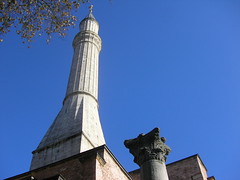 But Istanbul has other lessons besides those of the mystics. Seated under the Madonna in the Hagia Sophia, it's hard to forget that Istanbul, as Constantinople, started the idea of a Christian Empire. Augustine endorsed the empire for Christians, claiming that the church could use political power as a platform through which to transform the world. Rome enabled an empire that gave its citizens wide freedoms and a large degree of religious tolerance; Constantinople added to the freedoms of that empire the liberty of souls freed from sin. For Augustine, at least, empire could act to spread the gospel of individual liberty, of radical morality.
But Istanbul has other lessons besides those of the mystics. Seated under the Madonna in the Hagia Sophia, it's hard to forget that Istanbul, as Constantinople, started the idea of a Christian Empire. Augustine endorsed the empire for Christians, claiming that the church could use political power as a platform through which to transform the world. Rome enabled an empire that gave its citizens wide freedoms and a large degree of religious tolerance; Constantinople added to the freedoms of that empire the liberty of souls freed from sin. For Augustine, at least, empire could act to spread the gospel of individual liberty, of radical morality. 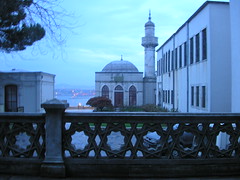 On the other hand is everything we have to learn from history, from Europe's past and from our own. French papers daily repeat the Enlightenment heritage of a morality whose foundation grows from the Judeo-Christian reverence for individual rights, but is compatible with a human family well beyond the sphere of the church. Roman ruins glows in the light of Augustine's vision of the use of empire to extend a Christian morality whose aims transcend those of the empire. The graveyards vibrate with Sufi whispers, telling us, always, every moment, to remember our our power to choose between material wealth or godly pleasure in the society of other human beings. There are the graves and ruins of empires -- Persian, Sassanid, Parthian, Greek, Roman, Byzantine, Ottoman -- reminding us of all the religions of Mammon that have come and been utterly destroyed, to remind us that we need not suffer from our empires forever.
On the other hand is everything we have to learn from history, from Europe's past and from our own. French papers daily repeat the Enlightenment heritage of a morality whose foundation grows from the Judeo-Christian reverence for individual rights, but is compatible with a human family well beyond the sphere of the church. Roman ruins glows in the light of Augustine's vision of the use of empire to extend a Christian morality whose aims transcend those of the empire. The graveyards vibrate with Sufi whispers, telling us, always, every moment, to remember our our power to choose between material wealth or godly pleasure in the society of other human beings. There are the graves and ruins of empires -- Persian, Sassanid, Parthian, Greek, Roman, Byzantine, Ottoman -- reminding us of all the religions of Mammon that have come and been utterly destroyed, to remind us that we need not suffer from our empires forever.
 Did anyone else see last month's Harper's? Harper's is one of the best essay magazines in America, and one of the most liberal. Harper's featured a dozen pages of photos of New Orleans, long after the rest of the media had forgotten.
Did anyone else see last month's Harper's? Harper's is one of the best essay magazines in America, and one of the most liberal. Harper's featured a dozen pages of photos of New Orleans, long after the rest of the media had forgotten. 